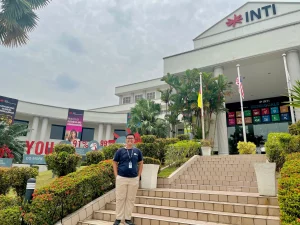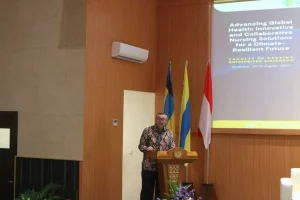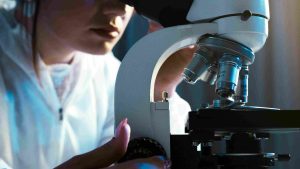UNAIR NEWS – Universitas Airlangga (UNAIR) Rector Prof Mohammad Nasih inaugurated new professors on Wednesday, August 31, 2022. In the inauguration ceremony taking place in Garuda Mukti Hall, UNAIR MERR (C) Campus, four new professors were inaugurated, including Prof Muhammad Miftahussurur dr SpPD-KGEH.
With a total 110 journal publications indexed by Scopus and H-Index: 19, UNAIR Vice-Rector for Internationalization, Digitization and Information was inaugurated as 122nd professor of the Faculty of Medicine (FK). In his scientific oration, Prof. Miftah raised the topic of diagnostic efforts, Helicobacter pylori eradication, and gastric cancer screening using a molecular epidemiological approach.
It should be noted that molecular epidemiology is a branch of epidemiology that studies the contribution of genetic and environmental risk factors at the molecular and biochemical levels to the etiology, distribution, and control of disease in populations.
In his presentation, the man born in Sidoarjo, September 29, 1979, revealed that Helicobacter pylori is the causing agent of gastritis, peptic ulcer, gastric lymphoma and gastric cancer. He also revealed that although the prevalence of H. pylori in Indonesia is low (<15%). However, after further mapping, several ethnic groups have the highest prevalence.
“Out of the 11% prevalence of H. pylori in Indonesia, Papuans (42%), Batak (40%), and Bugis (36%). It shows that the risk of the three ethnic groups being infected with H. pylori is higher than other ethnic groups in Indonesia, so we have to be careful,” he said.
He continued that it could not be separated from the migration between tribes around the world. Prof Miftah revealed that the Batak Tribe was a migration from the East African Ethnic 20,000 years ago. While the Bugis are a migration of the Maori ethnicity from Taiwan 10,000 years ago and the Papuan ethnicity is a migration of the Sahul Tribe.
Prof Miftah said invasive examinations are difficult to do with Indonesia’s limited number of endoscopists. So, Prof Miftah said that one alternative is through non-invasive examination.
However, he continued, the current problem with the non-invasive examinations in Indonesia, they have not been validated and the accuracy rate is still low. “In addition, there are other problems such as bacterial resistance, which is already quite severe because it has exceeded the resistance limit that has been set,” he explained.
For this reason, Prof. Miftah encourages the development of molecular epidemiological studies and the establishment of an endoscopy center and cancer prevention research, especially in high-risk areas. Considering, he added, the facts show that although the prevalence is low, H. pylori circulating in Indonesia is currently the malignant H. pylori and often causes gastric dyspepsia.
“In addition, in our findings, there are several other bacteria that have the potential to cause pre-cancer spread in Indonesia,” he said.
Therefore, he added, besides developing a research center, Indonesia must also improve the tracing system through non-invasive examinations and make it more accurate. “This effort should also be our moral responsibility as researchers, practitioners, and academics so that we can prevent H. pylori, especially in risky areas,” he concluded. (*)
Author: Ivan Syahrial Abidin
Editor: Nuri Hermawan









